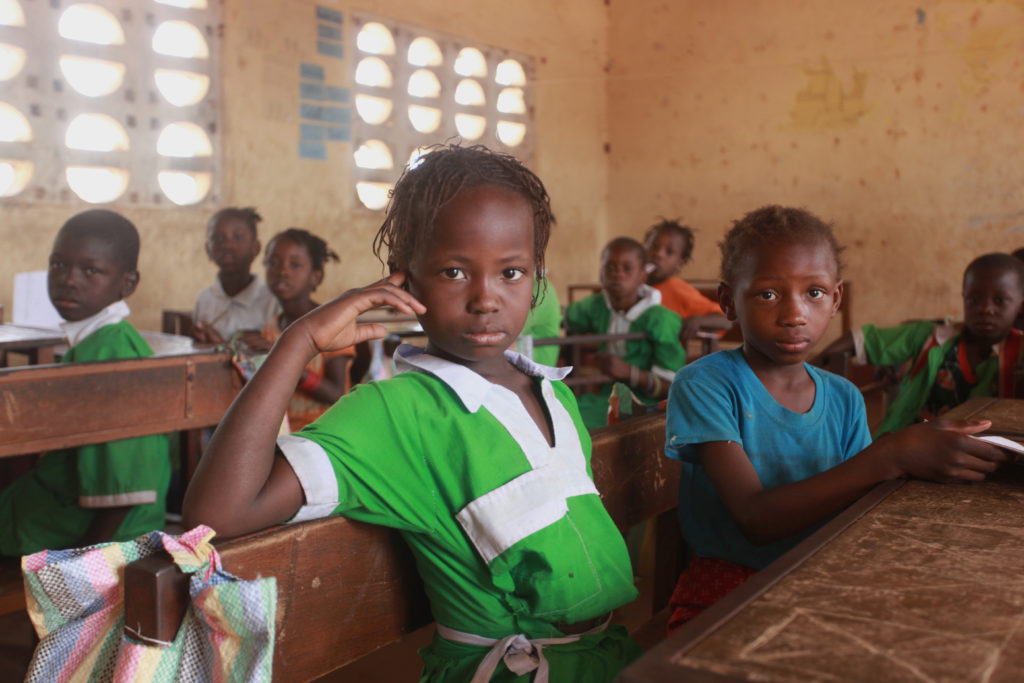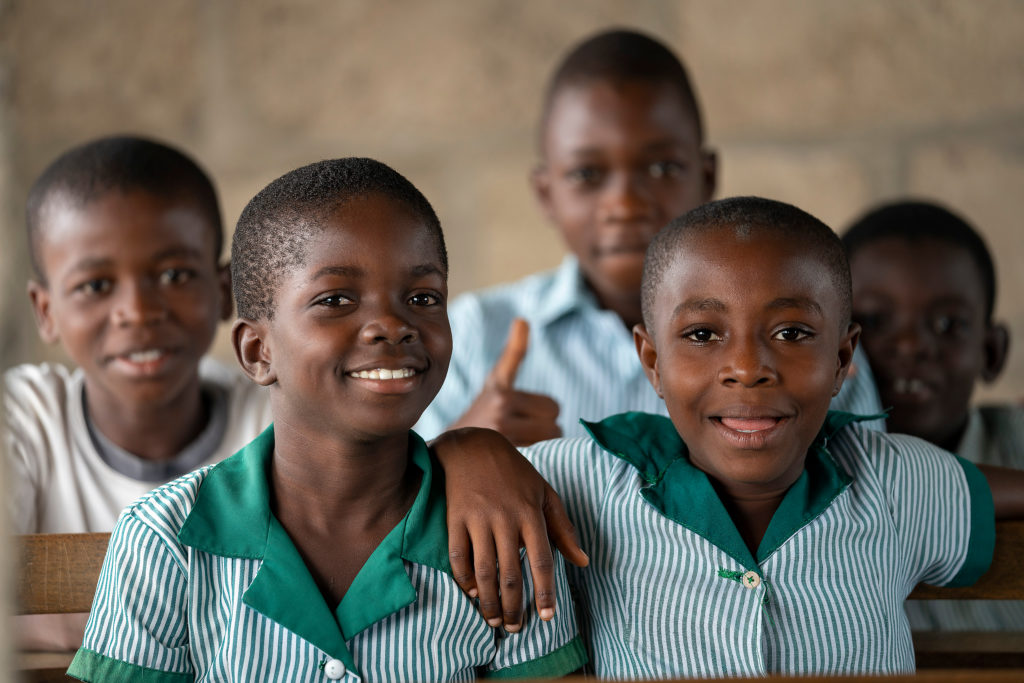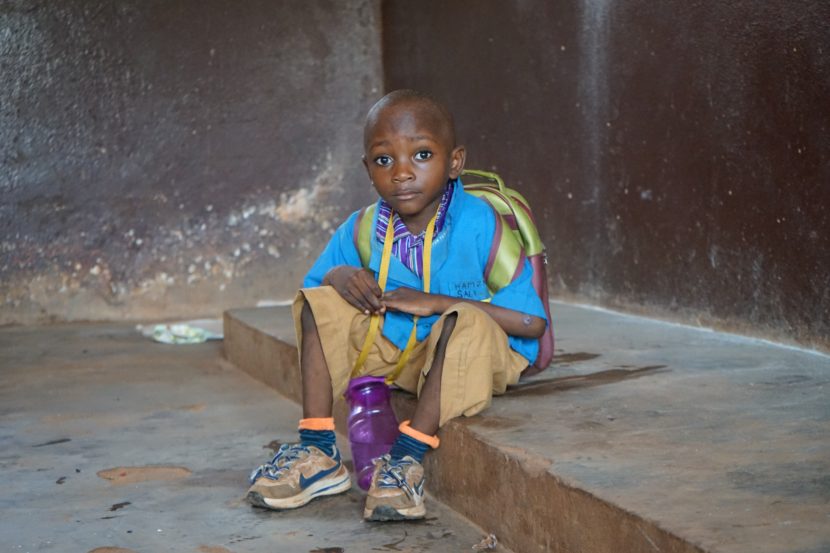At the start of the 2025 academic year, 285 million children are at risk of not returning to the classroom, a crisis felt most acutely across the African continent. Most African governments have consistently failed to meet global and regional education funding targets needed to ensure quality public education. Yet two promising examples, a global treaty initiative co-led by Sierra Leone and a national curriculum reform in Guinea-Bissau, show that advancing children’s rights to education is entirely possible.
Global education crisis deepens as millions remain out of classrooms in 2025
As schools reopen in 2025, millions of children are at risk of not returning to the classroom. Due to declining national spending on education and significant cuts by donor governments to international education aid, an estimated 272 million children and young people — 139 million boys and 133 million girls — are out of primary and secondary school, with nearly 200 million excluded from secondary education globally. This marks an increase of approximately 21 million out-of-school children since 2023 (Martínez, 2025).
The situation is particularly acute in conflict-affected regions, where an estimated 13 million children are out of school. Including those displaced by armed conflict, from Gaza to Sudan, brings the total closer to 285 million. Yet these figures fail to capture the full picture. Current global estimates do not account for an additional 175 million preschool-aged children who are not enrolled in early childhood education and are therefore missing out on critical early learning opportunities (Martínez, 2025).
Chronic underfunding exacerbates many of the systemic barriers and forms of discrimination faced by millions of children. Without sufficient investment, governments cannot provide genuinely free public education, build and maintain schools, supply quality learning materials, recruit and train qualified teachers, or adapt education systems to respond effectively to crises and emergencies (Martínez, 2025).
Africa’s education crisis leaves 100 million without schooling
Africa has the highest out-of-school rates in the world, with over 100 million children and adolescents estimated to be out of school across all sub-regions except North Africa. Out-of-school rates have increased since 2015 for reasons including population increases, persistent gender gaps, the cumulative effects of COVID-19 school closures, climate emergencies, and conflicts (HRW, 2025).
Many children also drop out due to school-related gender-based violence, as well as discriminatory and exclusionary measures against pregnant and parenting girls, refugees, and children with disabilities, among other negative practices (HRW, 2025).
Only 14 countries guarantee free access to education, from at least one year of pre-primary through secondary education, based on available UNESCO data and Human Rights Watch research. Only 21 guarantee free access to 12 years of primary and secondary education, while 6 legally guarantee access to at least one year of free pre-primary education (HRW, 2025).
Morocco (excluding Western Sahara territory that it occupies), Namibia, and Sierra Leone are the only three African countries that both legally guarantee universally free access to primary and secondary education and at least one year of free pre-primary education and that have met both international education funding benchmarks in the last decade (HRW, 2025).
Low education funding stalls progress in Africa
In 2015, UNESCO member states, including all 54 African countries, committed to increasing education spending to at least 4 to 6 percent of gross domestic product (GDP) and/or 15 to 20 percent of total public expenditure.

These internationally agreed-upon benchmarks have been reaffirmed in multiple global and regional agreements, like the 2015 Incheon Declaration, the Heads of State (“Kenyatta”) Declaration on Education Financing, the 2021 Paris Declaration and “Global Call for Investing in the Futures of Education”, and the 2024 Fortaleza Declaration. In 2024, African leaders further raised the upper GDP benchmark to 7 percent through the Nouakchott Declaration (HRW, 2025).
UNESCO member states also pledged to invest at least 10 percent of their education budgets in ensuring one year of free, compulsory pre-primary education by 2030, with African countries committing to increasing funding for early childhood education (HRW, 2025).
However, only one-third of African countries met the globally endorsed education funding benchmarks for annual average spending over the decade 2013 to 2023. The figure declined to just one-quarter of countries by 2022 and 2023. Fourteen African countries did not meet any of the benchmarks in fa single year over the past decade (HRW, 2025).
In concrete terms, this means that governments have failed to eliminate tuition and other school fees, especially at the pre-primary and secondary levels, leading to unequal access, retention issues, and poor quality in schools, with a disproportionate impact on children from the poorest households. Families across Africa continue to bear a heavy burden in funding education, absorbing 27 percent of total education spending (HRW, 2025).
Two success stories in expanding children’s education access
New UN treaty proposal on children’s right to education
Following a top-down approach, one instrument which could improve children’s access to quality education is represented by the adoption of a new Optional Protocol to the Convention on the Rights of the Child.
In July 2024, the UN Human Rights Council decided to draft a new Optional Protocol to the Convention on the Rights of the Child, focused on the right to education. This new treaty would be narrowly focused on upgrading international human rights law to recognise that all children have a right to early childhood care and education, to free public pre-primary education (beginning with at least one year), and to free public secondary education (Sheppard, 2024).
The initiative has been led by Luxembourg, the Dominican Republic, and Sierra Leone, and was supported by 46 co-sponsors from across the world’s regions (Sheppard, 2024). In September 2025, a new intergovernmental working group established by the UN Human Rights Council will meet to consider drafting a new optional protocol to the Convention on the Rights of the Child on the right to education (Todres, 2025).
Specifically, the working group has the mandate of exploring the possibility of elaborating and submitting to the Human Rights Council the fourth optional protocol to the Convention on the Rights of the Child (OHCHR, 2024). The result could be the first new UN treaty law on children’s rights in more than a decade (Todres, 2025).
A new optional protocol on the right to education could significantly strengthen both international and national commitments. It would require states to publicly affirm their commitment to progress on children’s right to education by ensuring free education from pre-primary through secondary school. This would require states to redouble efforts to identify and allocate sufficient resources for children’s education, not only to cover school fees but also other more hidden costs, including books and other supplies, school uniforms, transportation, meals and more (Todres, 2025).
The protocol could also promote new forms of international cooperation to secure adequate funding, and it would enhance the Committee on the Rights of the Child’s authority to engage states on these issues and press for progress. Finally, given education’s “multiplier effect,” a new optional protocol could help unlock wider human rights and long-term development benefits (Todres, 2025).
Sierra Leone has been co-leading the initiative, and Botswana, Burundi, Gambia, Ghana, Malawi, South Africa, and South Sudan have publicly expressed support for this process (HRW, 2025).
Guinea-Bissau launches new primary school curriculum
Following a bottom-up approach, one instrument which could improve children’s access to quality education is represented by the initiative led by the Government of Guinea-Bissau to design a new primary education curriculum.
The RECEB Project – Curricular Reform of Basic Education in Guinea-Bissau is an education reform programme which was launched in 2015 to introduce the country’s first curriculum overhaul since the 1980s. In 2022, ten schools piloted the newly developed teachers’ guides and students’ textbooks for Years 1 to 4. These materials were finalised in 2023 and, in 2024, distributed to 560 public primary schools across five targeted regions (GPE, 2025).
“Updating the curriculum allows us to teach unified content, and training has enabled teachers to get to know the content better and plan their lessons. Before, each teacher had their own content and notes. Now, we teach on a national level, and a student from the South can move to the North and will still follow the same lessons.”
– Babucar Sisse – Director, Escola 1.º de Junho (GPE, 2025)
The new primary education curriculum adopts a competency-based approach, which includes cross-cutting areas such as life skills. It promotes more active and child-centred pedagogies to improve learning quality (GPE, 2025). A key goal of the RECEB Project is to strengthen both mathematical and language skills. The curriculum addresses citizenship education for the first time, through which children can learn about peace, respect for diversity and Guinea-Bissau’s ethnic mosaic, a vital foundation for rebuilding a country long troubled by civil war and coup threats (Soromenho, 2025).
To ensure teachers were equipped to implement the new curriculum and use the updated teaching and learning resources effectively, the Ministry of Education rolled out a nationwide teacher training programme between 2022 and 2024. This programme reached nearly half of all Year 1–4 teachers in the country, amounting to a total of 3,015 teachers from all 560 targeted schools. Schools were provided with speakers, solar-powered power banks and tablets preloaded with a digital platform containing all curriculum-related materials, including 200 audio lessons designed to support Portuguese and maths instruction for Years 1 and 2 (GPE, 2025).
Results from pre- and post-training assessments proved that over 80 percent of the trained teachers showed significant improvement in their ability to teach both Portuguese and maths, marking a major step forward in building teaching capacity and improving learning outcomes nationwide. Based on evidence from these schools, the education ministry is expanding the new curriculum to all other schools and regions (GPE, 2025).
Global action to fund and protect children’s education
Ending the education crisis requires the joint efforts of national governments, donor countries, international bodies, and civil society, working together to guarantee every child’s right to learn. Tackling the global education crisis requires governments to keenly protect public education budgets from regressive austerity measures and cuts and allocate resources commensurate with their obligations to guarantee the right to education.
All governments must commit to ensuring access to free, quality public education for all (Martínez, 2025). Governments should meet internationally agreed education funding benchmarks to increase education spending to at least 4 to 6 percent of gross domestic product (GDP) and/or at least 15 to 20 percent of total public expenditure (Martínez, 2025).
This is especially true for African states, which have endorsed several global and regional declarations such as the Nouakchott and Fortaleza Declarations, committing not only to increasing education spending up to 7 percent of GDP but also dedicating a minimum of 10 percent of education budgets to guarantee one year of free, compulsory pre-primary education by 2030. Yet these ambitious targets have largely remained on paper. It is therefore crucial that new financial commitments be not only clearly defined but also realistic, time-bound, and effectively implemented.
Donor governments should especially recommit to funding education in line with overseas aid commitments and human rights obligations to provide international assistance and cooperation (Martínez, 2025). In this sense, the proposal for a new Optional Protocol to the Convention on the Rights of the Child on the right to education would provide impetus to develop new models of international cooperation that ensure adequate resources to secure free education for every child (Todres, 2025).

We at Humanium strongly believe in the importance of quality education for all. In this sense, sharing best practices across countries in the field of children’s access to quality education is part of our mission to call governments to play their role in adopting new strategies that provide more investments in education, as we call citizens to join us in advocating for equitable access to education. Join Humanium by sponsoring a child, making a donation, or becoming a member or a volunteer!
Written by Arianna Braga
References:
Calouste Gulbenkian Foundation (2025). RECEB – The Reform of Primary Education in Guinea Bissau. Retrieved from Calouste Gulbenkian Foundation at https://gulbenkian.pt/en/read-watch-listen/receb-the-reform-of-primary-education-in-guinea-bissau/, accessed on 5 August 2025.
GPE (2025). Guinea-Bissau: Over 3,000 teachers trained to deliver a modernized curriculum. Retrieved from Global Partnership for Education (GPE) at https://www.globalpartnership.org/blog/guinea-bissau-over-3000-teachers-trained-deliver-modernized-curriculum, accessed on 5 August 2025.
HRW (2025). Africa: Insufficient Domestic Funding Hinders Education Progress. Retrieved from Human Rights Watch at https://www.hrw.org/news/2025/06/16/africa-insufficient-domestic-funding-hinders-education-progress, accessed on 8 August 2025.
Martínez, E. (2025). 272 Million Children out of School a Major Wake Up Call. Retrieved from Human Rights Watch at https://www.hrw.org/news/2025/07/07/272-million-children-out-of-school-a-major-wake-up-call, accessed on 8 August 2025.
OHCHR (2024). Resolution adopted by the Human Rights Council on 10 July 2024 (A/HCR/RES/56/5). Retrieved from OHCRC at https://docs.un.org/A/HRC/RES/56/5, accessed on 6 August 2025.
Sheppard, B. (2024). Organizing for a new treaty on free public education. Retrieved from Education International at https://www.ei-ie.org/en/item/29246:organizing-for-a-new-treaty-on-free-public-education, accessed on 6 August 2025.
Soromenho, A. (2025). La scuola nuova. Retrieved from Internazionale at https://www.internazionale.it/magazine/ana-soromenho/2025/07/03/la-scuola-nuova, accessed on 5 August 2025.
Todres, J. (2025). Considering a New Optional Protocol to the crc on the Right to Education. Retrieved from Brill at https://brill.com/view/journals/chil/33/2/article-p257_001.xml?srsltid=AfmBOoo4C-URxCUKWtd3JCw1XmjhpXZxjiN0BkBHWDPM6DO1gYz2uD3Y, accessed on 6 August 2025.


